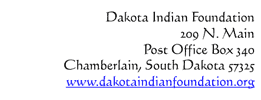

Background
At the time of her death in 1971, Ella Deloria had been living in a small cottage at the Green Acres Motel Court in Vermillion, South Dakota. The manuscripts that she had in her possession represent a cross-section of her studies. They are largely undated, but most relate to her projects from the 1940s-1960s. These materials were transferred to the University of South Dakota. The university created the Ella C. Deloria Professorship to curate them, a position filled by Dr. Agnes Picotte. Funding for the professorship was provided by the Dakota Indian Foundation, Chamberlain, South Dakota, beginning in 1974. In 1983 Dr. Picotte requested Deloria's literary heir, her brother Vine V. Deloria, Sr., to transfer the collection to the Dakota Indian Foundation. That year the collection was moved to Chamberlain, where Dr. Picotte continued her work until 1995.
In July 1996 Ron Kjonegaard, then director of the Dakota Indian Foundation, asked Raymond J. DeMallie and Douglas R. Parks, co-directors of the American Indian Studies Research Institute at Indiana University, to provide an assessment of the collection. They reorganized and consolidated the collection, separating Deloria's original material and making it easier to access. However, since the foundation does not have facilities for visiting researchers, the board of the Dakota Indian provided a grant to prepare an electronic edition of Deloria's original manuscript material in their possession. The project was overseen by DeMallie and the work was carried out at Indiana University. This on-line edition does not include a variety of secondary material amassed by Dr. Picotte that is also archived at the Dakota Indian Foundation, most importantly photocopies of correspondence from and about Deloria and her family drawn from a wide variety of archival sources. Nor does the on-line edition reproduce the Lakota vocabulary cards, themselves photocopies of the originals in the American Philosophical Society, which have only an occasional emendation in Deloria's handwriting. Instead, the information on these cards has been incorporated into a lexical database that will be made available in published form.
Created by American Indian Studies Research Institute, Indiana University